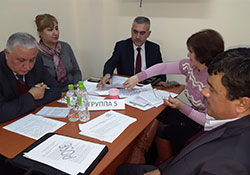Review of polio-related risks in the WHO European Region as global eradication nears

WHO
With endemic circulation of wild poliovirus now confined to 3 countries in the world and a record low number of cases detected so far this year, global eradication of poliomyelitis (polio) is closer than ever. No cases of wild poliovirus were detected in the WHO European Region in 2016, and the likelihood of the virus being imported into the Region has declined as a result of global efforts to eradicate the disease. This was concluded by the European Regional Commission for the Certification of Poliomyelitis Eradication (RCC) at its meeting on 31 May–1 June 2017 in Copenhagen, Denmark. However, specific risks remain in the Region that require continued vigilance.
- Three countries in the Region border Afghanistan, where wild poliovirus still circulates, putting them in the frontline of potential cross-border importation.
- Low immunization coverage in some countries in the Region leaves them at risk of sustained circulation following emergence of any imported or vaccine-derived poliovirus case.
- The majority of vaccine production facilities that handle polioviruses are located in the Region. All countries planning to retain poliovirus research or vaccine production capacities after polio eradication must now ensure proper containment of potentially infectious poliovirus materials in line with the "WHO global action plan to minimize poliovirus facility-associated risk after type-specific eradication of wild polioviruses and sequential cessation of routine OPV use" (GAP III).
Annual assessment
The RCC is an independent panel of 5 international polio experts, who together monitor the status of polio eradication efforts in the Region. This year, it reviewed the annual reports for 2016 from all 53 Member States, including data on polio surveillance, immunization programme performance, and implementation of GAP III. 2017 marks the first year in which all Member States submitted their reports in advance of the RCC meeting.
The RCC Chair, Professor David Salisbury, welcomed the high quality and timeliness of these annual reports. However, to further support the RCC’s assessment of polio-related risks in the Region, he encouraged the National Certification Committees to include more information on mitigation and preparation efforts related to the specific polio-related risks that their countries face. “In anticipation of global eradication it is vital that we collect more detailed evidence on risk and preparedness, also in collaboration with other WHO regions.”
WHO/Europe support to countries
During its meeting, the RCC was also briefed by WHO on the global eradication programme and WHO/Europe’s work to support countries’ immunization and risk mitigation efforts. This included updates on the European Polio Laboratory Network, progress in poliovirus containment, development of an online annual reporting system on polio eradication activities (e-APR) and polio outbreak simulation exercises (POSE) conducted in the past year. The latter included exercises conducted in Azerbaijan, Latvia, Montenegro and Tajikistan.
Regional progress in surveillance data collection and reporting was highly appreciated and further improvements encouraged by the Commission. Regarding POSE, Professor Salisbury noted that “these exercises are valuable and should be focused on country-relevant risks. Our higher-risk countries should be conducting and repeating exercises based on the specific risks they currently face. All vaccine-producing countries and those planning to host Polio Essential Facilities should be encouraged to conduct exercises on breaches of containment”.
Face to face review
The RCC also met with representatives from the Russian Federation and Ukraine to review response activities undertaken following vaccine-derived poliovirus (VDPV) events, as well as risk and mitigation activities in these countries.
Conclusions
Based on all information received from countries, the RCC concluded that the Region has retained its polio-free status. Country-specific conclusions and recommendations will be presented in the meeting report to be posted on the WHO/Europe website in English and Russian.



